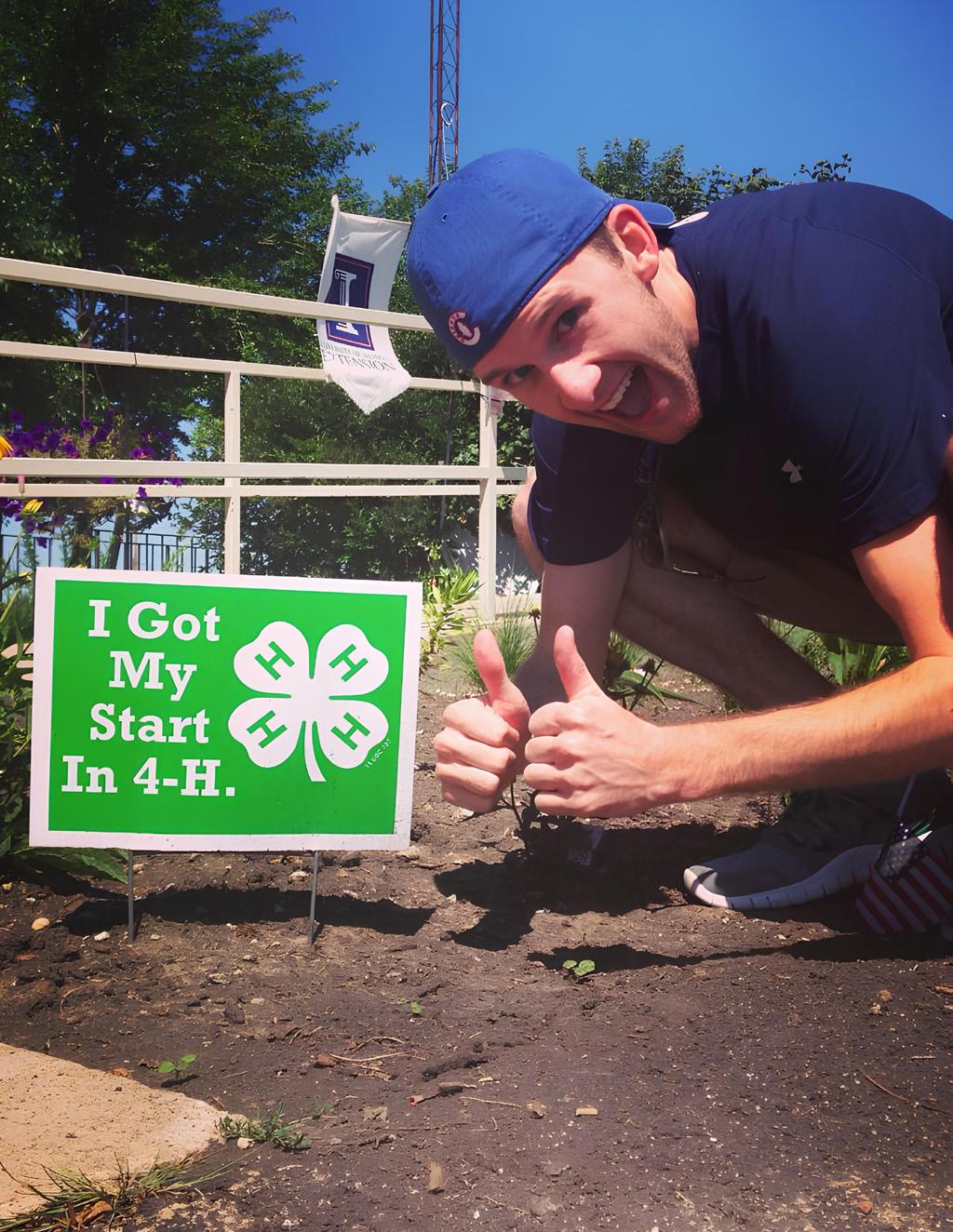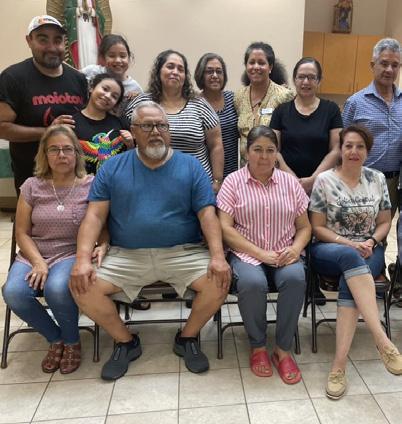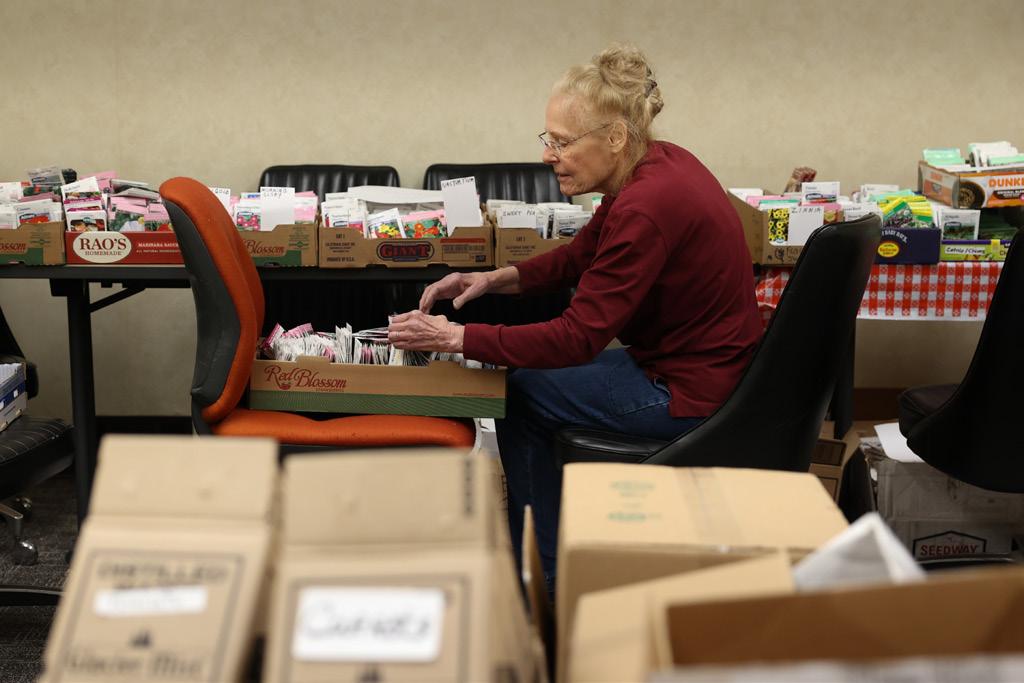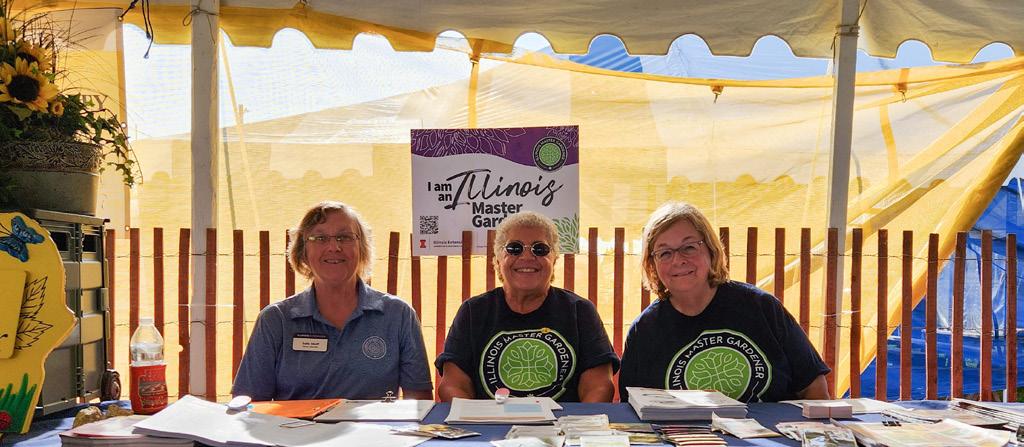


Marilu Andon County Director





Marilu Andon County Director

When I sit down to tell the University of Illinois Extension story, I always start by saying Extension is the community.
Illinois Extension is, and always will be, an institution that prioritizes local communities.
From Kinsman to Pembroke Township, Nettle Creek to Beecher, Plainfield to Chebanse, and so many more across the map, Illinois Extension is available to reach people from all communities of Grundy, Kankakee, & Will counties.
We bring local staff, who are experts in their fields and who have experience working within the community, together under one roof to impact the people of their communities.
The reason why Illinois Extension and our family of programs is so impactful is because we believe in a future where local voices are fostered and supported, where problems are dealt with by local experts concerned with local solutions guided by the network of experts that is Illinois’ largest educational institution: University of Illinois Urbana-Champaign.
We bring communities together to make change:
• Our 4-H program impacts youth through positive youth development experiences, connecting youth and caring adults with programs that succeed due to these positive youth and adult partnerships.
• Our Master Gardener and Master Naturalist programs make the outdoors accessible, even to those without the resources to access them.
• Our SNAP-Ed program prioritizes healthy behaviors to bring change to communities.
• Our Local Foods program connects local communities with the resources they need to think critically and solution-focused to help identify and grow food sources.
These are only a few examples of our programs and the great work they accomplish. I invite you to read more and encourage you to follow along on our website and on social media.
Together, we can change the world.

Marilu Andon County Extension Director
The University of Illinois UrbanaChampaign’s land-grant mission thrives each day through Extension’s programs, resources, knowledge, and dedicated staff that are responsive to five grand challenge themes:
Community: Support Strong and Resilient Residents
Economy
Environment
Food:
Maintain a Safe and Accessible Food Supply
Health: Maximize Physical, Mental, and Emotional Health
2023 Engagement Extension leaders, staff, and stakeholders define priorities that create meaningful, mission-centered outcomes throughout the state:

Whether you know us from 4-H, classroom embryology, Master Gardener trainings, greenhouse school programs, afterschool robotics, SNAP-Ed or another program, Illinois Extension works behind the scenes with local experts solving local problems.
We have many different names because we work to address many different problems - but all of our programs have a common denominator: They are all implemented by Illinois Extension directly within the communities of Grundy, Kankakee, & Will Counties.
Illinois Extension leads public outreach for University of Illinois by translating research into action plans that allow Illinois families, businesses, and community leaders to solve problems, make informed decisions, and adapt to changes and opportunities.
Housed within the College of ACES and relying on local, state, and national funding sources, Illinois Extension is part of the nationwide, Cooperative Extension network. In Illinois, a workforce of over 600 staff serve the state’s 102 counties through 27 multi-county units that forge partnerships, respond to local needs, and develop programs to make the state and its residents happier, healthier, safer, and more prosperous.




Illinois Extension provides programming to communities in Grundy, Kankakee, & Will Counties. Through our local, state, & federal funding streams, we are able to provide exceptional programing through our team of knowledgeable educators, program, and office staff. Federal funds include Illinois Nutrition Education Program grant monies. Local funds include donations from 4-H Foundations, 4-H Federations, United Way of Grundy County, United Way of Will County, and program fees.
Extension’s mix of federal, state, and local funds mixed with volunteer time and in-kind donations make it hard to exactly calculate a return on investment. However, in an independent report in 2020, Extension’s robust breadth of work directly in the communities had economic and functional impacts of nearly 10x more than the Illinois Extension budget.
Read the report go.illinois.edu/ExtensionImpact
30,321 People reached by direct extension programming 1
9,331 Volunteer hours in the community 2
$304,946
Value of volunteer time 3
1 Individuals participating in multiple program areas may be counted more then once. 2 Includes self-reported hours for Master Gardeners, Master Naturalists, & Master Composters. 4-H hours are based on an average of 96 hours per volunteer. 3 Based on Independent Sector Value of Volunteer Time.
While numbers do a great job explaining the scope of our work, they don’t explain the vast impact and reach of our programs.
Many Extension programs, including 4-H, are holistic, multifaceted, and provide both immediate and long-term benefits. Additionally, much of our work falls into the category of indirect education - such as guidance provided at a career night, a promotional campaign to fight obesity, etc.
This makes it hard fully quantify our impact. That’s why we are proud to present this annual report - filled with stories that tell our impact to the community.


From Grundy 4-H member to State 4-H Leadership - Dr. Kevin Carey, inspired by 4-H leadership skills and fostered through positive youth and adult partnerships, credits 4-H for success.
The 4-H experience creates opportunities and environments for all youth to thrive now and in the future. For Dr. Kevin Carey, 4-H provided an avenue into higher educational leadership.
A Grundy County native and the son of Tim and Belinda Carey, Kevin was active in 4-H - participating as an 11-year 4-H member of the Highland Ag 4-H Club.
4-H, for Kevin, provided an avenue for self-expression and career development opportunities. Showing cattle and sheep at the Grundy fair and through the many leadership opportunities 4-H provided, Carey learned the importance of leadership and community.
The 4-H organization has always been a part of my life. My local 4-H experience in Grundy County made a critical difference in my learning and growth.
Dr. Kevin Carey
As he served in leadership roles throughout his 4-H career, Kevin began to develop a passion for leadership and giving back to his community. In his last years in 4-H, Kevin was selected and served on the twenty-two person leadership team known as the Illinois 4-H Youth Leadership Team (YLT) - Illinois 4-H’s highest young adult leadership role offered at that time.
Positive youth and adult partnerships is a vital aspect of the 4-H program and it was on YLT where Kevin met and worked with one of his mentors who inspired him to continue to give back to his community - now retired, Extension specialist Deb Stocker.
Through this positive mentorship experience, Kevin learned the importance of peer-to-peer support, leadership, and service to one’s community. With this background, he began a career in higher educational leadership - serving as the Dean of Students for Campus Life at Illinois Wesleyan University.
I loved when I got to visit Deb in the office and listen to her wisdom. She took a huge chance on me, a steer showing kid, and supported me during my time on the Youth Leadership Team.
Deb, you always believed in me, helped me see my potential, and modeled commitment everyday. You have always believed in our youth and what’s even more beautiful about you is that you haven’t stopped!
Dr. Kevin Carey
Now, the Senior Program Lead for Positive Youth Development and the acting 4-H Program Director, Kevin now heads to work just a few doors down from Deb’s office where she worked before she retired.
This ability for youth to explore their interests in a safe space surrounding by caring and supportive adults is what makes 4-H so unique amongst other after-school programs.
Thriving youth are the core of healthy, robust communities. Illinois Extension’s mentorship-based youth development model focuses on social competence, academic success, career development, and community connection.
The 4-H experience creates opportunities and environments for all youth to thrive now and into their adult lives. For Kevin, this means a career in statewide 4-H leadership - rooted in giving back to youth just as his mentor once did for him.

Where there is food insecurity, Illinois SNAP-Ed staff are on the ground educating and providing direct impact
Research shows a strong link between food insecurity, poor physical and mental health, and even poor academic outcomes for children. Food insecurity is not just about hunger. It also indicates a decrease in access to food that is culturally relevant and nutritionally robust.
Illinois Supplemental Nutrition Assistance Program Education (IL SNAP-Ed) provides community-based nutrition education for individuals and families eligible for the Supplemental Nutrition Assistance Program (SNAP).
In Illinois, the SNAP-Ed program is known as Eat. Move. Save. The program is delivered by University of Illinois Extension and University of Illinois Health’s Chicago Partnership for Health Promotion.
Locally, SNAP-Ed staff have held over 454 direct education classes in the community which have directly reached over 1,100 participants.


These numbers become much higher when you consider reach - SNAP-Ed staff participate in a number of direct and indirect activities including passing out flyers, hosting educational booths, providing expert advise and resources, and so much more. SNAP-Ed work is never done but the impact that this program has directly on the community is substantial.
Results show that IL SNAP-Ed encourages steps toward health and wellness among Illinois residents. To better understand this impact, a study and report was conducted to help quantify this information. Below are a few highlights along with the link to read more:
• Illinois SNAP-Ed returned between $5.36 and $9.54 per dollar spent.
• An estimated 5,060 cases of obesity were prevented in Illinois children and adults in a single year.
• 66% of Illinois residents who saw an Eat.Move.Save Social Marketing Campaign reported taking action after being exposed
Food insecurity affects every community in Illinois. Illinois Extension connects youth, volunteers, and partners, working together to address the needs of communities most impacted by food insecurity through research, community service and advocacy.
Read more about IL SNAP-Ed Impact: extension.illinois.edu/global/snap-education-impact

Expert advice and free seeds brings the community together.
A strong sense of community brings people together to develop shared goals, support one another in times of need and growth, and work together for the good of the whole.
Joliet Seedfest, typically held annual in the spring, brings individuals from across the county and all walks of life centered around a common interest: Gardening and growing food or flowers.
This is just a great community event. What a way to help get Will County growing! Family of five at Seedfest
Each member of the public is allowed to grab up to 15 packages of seeds (available for free due to the generous support of Midwest Food Bank). After grabbing seeds, they can ask questions of Extension experts and participate in learning stations hosted by volunteers.
Seedfest connects the public with Extension experts for advice, free seeds, and discussion amongst individuals with common interests.
The event brought over 1,000 participants - all with vary horticultural backgrounds, from the expert gardener to those who have never planted anything before, united in a common interest.
Accepting and celebrating differences creates an environment where all voices are recognized and respected. When strong networks of peers and organizations support youth and families, even the most vulnerable community members feel they belong and are valued.
Thank you so much for the free seeds...but also for the information. We learned so much at the learning stations and can’t wait to get planting. Family of five at Seedfest
Keep tabs on all our events online extension.illinois.edu/gkw/events

Weekly Greenhouse program brings joy and builds life skills
There is growing evidence that time spent around plants and in green spaces has many benefits, including improved health, better interpersonal relationships, and a higher quality of life.
For the students at Union Greenhouse, planting seeds, growing vegetables, and tending the greenhouse is just a part of the day for students at this longterm program in Joliet.
Volunteering at Union Elementary School in Joliet affords me the great pleasure of helping young people to learn about nature through gardening and to develop their selfesteem through success in harvesting what they planted. The joy and enthusiasm of these youngsters is extremely contagious and rewarding. I look forward to being part of this greenhouse program every week.
Stephen F. Midlock, Ed.D., Volunteer

Each student in pre-K through 8th grade receives weekly programming direct from Illinois Extension every single week of the academic year. This builds relationships and life skills.
The program culminates in a one-hour plant sale where each student is assigned a job and allows them to see the direct impact of their work.
When strong networks of peers and organizations support youth and families, even the most vulnerable community members feel they belong and are valued.

Illinois Extension is a resource for all questions related to horticulture and gardening - our connection to experts means we can address almost any question (or direct them appropriately!)
Sustainable home landscapes increase property values and build stronger ecosystems for plants and wildlife. There is also growing evidence of the personal benefits that being in and around green spaces brings. These benefits are great but what are you supposed to do when you have a question about your garden, landscape, or outdoor area?
Illinois Extension is here to help with trained staff and volunteers - plus, access to thousands of experts as part of Illinois’ largest educational institution: University of Illinois Urbana-Champaign.
Check out some answers to real questions that Extension experts have received, and then submit your own question.
The questions presented are real questions received and answered by Illinois Extension staff. Questions may have come from various sources - such as email or phone call - and appear in this report along with the provided answers. Questions and answers may be abridged or edited for length, clarity, or style.
I have a 30 yr. old purple ash tree which has been doing well, and has never been treated for ash borer. Last spring it looked somewhat thinner on top, so I had an arborist look at it, but he said it was OK - said just to prune off the few dead branches.
But now I see some holes and slits in the branches, and concerned about it. Attached are some pictures of what I see, which is about 10’ off the ground.
This does indeed look like Emerald Ash Borer damage in the images where you see the bark sloughing off. The insects feed on the circulatory system causing a death of that area and the bark gives way. It is not always easy to see the D shaped holes specifically.
If you do see additional woodpeckers, they are not causing the problem, but are coming to help! They eat the larvae. Do you have any photos of the tree in leaf last year?
You can still have the tree treated although research indicates that once the bark starts coming off, it may be too late to save the tree for long. You can have the tree professionally treated, or you can purchase a systemic pesticide containing the active ingredient imidacloprid. The University doesn’t recommend one brand over another but one of the common brands this insecticide...
Have you published a proposal on how homeowners can protect their trees from the oncoming locusts this Spring, and perhaps approved commercial businesses that will spray trees for homeowners?
If homeowners purchase a sprayer to spray their own trees, what should they be sprayed with? Vinegar?
...As far as recommendations for trees during the periodical cicada emergence this spring/ summer, most trees will not need any extra care.
But if you have young fruit trees, you can cover them with a small gauge netting - some people are purchasing netting from fabric stores because it is inexpensive. Cover the trees when emergence begins and then removing the cover when they are gone within 3-5 weeks.
The reason we recommend this covering is that the only real damage that cicadas do is when the female lays her eggs she makes slits with her ovipositor (egg tube) in the ends of branches. Sometimes these slits will weaken that end of branches and they may break off. It is only significant for fruit trees because of the spur bearing branches...
The tree is turning black around the area where it lost a limb and the bark is separating from the tree around where the limb was removed. I am not sure if the tree can be saved or not. I have some pictures I can send you if that would help.
Attached are photos of the apple tree. The tree lost a limb last year and I trimmed it back to the trunk of the tree. Not sure if anything can be done for the tree or if needs to be removed. Thanks.
Hi, Charlie, This looks like canker disease from the blackening and the splitting of the bark. In that case, best to remove the tree.
First though, take a look at this university handout on apple and pear canker.
From the pics you sent, was that the main trunk that was cut off or a side branch?
I just bought a small house in Florida to start spending the winters. The house came with several types of palm trees - which I know nothing about. And I’m sure this isn’t your area of expertise, but I thought I would ask anyway. Attached are 3 pictures of one species that I have. Can you tell me what species it is?
Thanks for reaching out and congratulations on the Florida home! What I would suggest is looking up the Extension Service contact in the county your new place is located in Florida and I am sure they will have the information you need. I hope this helps. If you do not find answers feel free to reach back out to me.
I was given a box of yellow iris bulbs my neighbor dug out. I knocked the dirt off them and have them in a plastic milk crate down in the basement. Can I wait till spring to plant of should we put them in the ground soon? I read they need full sun to do ok when planting.
You should plant those irises now. They tend to desiccate (dry out to the point of death) if not planted.
Unlike cannas and gladiolus, which can withstand and need overwintering inside, irises are true perennials and should be planted.
Let me know if you have any additional questions!

Do you have a gardening question that our experts can help address? Contact us! extension.illinois.edu/gkw/contact

From beekeeping to the protection of native wetland, Wilderness Wednesday educates the public to create sustained impact in the lives of others.
The survival of our planet depends on the quality of our water, land, energy, and air. These shared resources must be managed through sustainable practices that support ecological balance. But, for the general public that may only have a passing interest, it can be hard to communicate these important concepts.
Our speakers take pieces of our everyday world and present captivating webinars so everyone, regardless of their level of expertise, can engage with our fascinating world.
Holly Froning, Extension Program Coordinator
Enter Wilderness Wednesday hosted by Illinois Extension and sponsored by the Kankakee River Forest Preserve District. This completely free webinar series is offered twice a year with changing schedules of topics and speakers.
Each speaker brings something different to the table and the webinar series sets itself apart due in no small part to the diverse lineup of speakers. From graduate students and Extension staff to outside experts from various backgrounds, each session promises a unique perspective.
I enjoyed the presentation, and I had not realized the variety of bumble bees that exist. Program Participant
With topics ranging from weather patterns to the intricate ecosystems of animals and plants, and everything in between, each hour long webinar serves as a platform to showcase the rich biodiversity of our local communities.
In a changing climate, Illinois Extension helps Illinois residents make informed choices on stewardship of this rich biodiversity to ensure sustainable environment and ecosystems supporting healthy living and climate resilient communities.

View recordings from Wilderness Wednesday youtube.com/@uiegkw

At the heart of the agriculture industry are local growers and farmers who work to feed communities, support families, and bolster the state’s economy. Illinois Extension brings support and is proud to welcome a dedicated expert to the team to serve this vital area of our work within the community.
Learn more about Renzo, Extension Educator: go.illinois.edu/GKW-lfssf
Whether large commercial agriculture operations, small farms, or community and backyard gardens, the future of our food supply relies on use of practices that boost production and capacity. In Illinois Extension, we believe in expanding our network by working with community organizations
Building a solid agriculture business foundation with Pembroke Farming Family Association
Economically resilient communities are built on a solid foundation. With 75% of the state’s total land area classified as farmland, agricultural operations, both large and small, are critically important to the local and state economy. Illinois Extension provides assistance to help Pembroke Farming Family Association apply for the Farmer Veteran Fellowship program. Including supporting veterans in the community in developing a business plan for their agricultural business, record keeping, budget, SWOT analysis, and other topics. This collaborative process helps build solid communities.
Illinois Farm Bureau provides unique partnership Growers at all levels benefit from effective, efficient, and sustainable approaches to cultivating produce, crops, and livestock that feed their families, communities, and the world. Illinois Extension partners with Farm Bureau within the three counties on initiatives that promote agriculture and educate growers and producers. Our staff work collaboratively on initiatives such as Certified Livestock Manager Training held in Morris, Farm Mental Health initiatives such as “4-H & KendallGrundy Farm Bureau says support a farmer” and much more.
Read more about one longstanding initiative: go.illinois.edu/gkw-support-a-farmer

Agricultural work includes a number of unique stressors, such as impacts of weather and events, commodity prices, loan interest rates, managing the farm business, long work hours, working with heavy machinery, and at times, working closely with family. Stress among people in agriculture is important because it can contribute to negative mental health outcomes, and people in agriculture have higher rates of depression, anxiety, suicidal ideation, and deaths by suicide compared to the general population.
Illinois Extension is here to help. You aren’t alone. See our resources below.
Visit our farm mental health website for resources extension.illinois.edu/health/farm-mental-health


Supporting local farmers as we provide fresh food to underserved communities is vital in working to build a resilient food system. Those who are a socially disadvantaged grower or producer located in Illinois can sell qualifying products through Local Food Purchasing Assistance. Lead agencies will purchase products from farmers at Fair Market Value.
If you are interested in becoming an IL-EATS grower and producer or are interested in becoming a community partner to distribute purchased food, contact us below!
For information, contact Renzo or Holly: extension.illinois.edu/gkw/staff
Growing small fruits offers many advantages to a gardener who is willing to provide the space and care plants require. All major small fruits, including strawberries, raspberries, blackberries, blueberries, currants, gooseberries, and grapes, can be grown successfully in most parts of Illinois.
These plants tolerate small spaces and are popular even for city lots. Space limitations can be overcome by fitting small fruit plants directly into the overall landscape in shrub borders, screen plantings, arbors, hedges, patios, or perennial gardens.
Learn more about growing small fruits: extension.illinois.edu/small-fruits


For many individuals, the presence of a disability or chronic health condition can jeopardize their agricultural futures. Yet, with some assistance, agricultural producers and workers with disabilities can safely and effectively continue to earn their livelihoods in production agriculture and participate fully in rural community life.
AgrAbility serves farmers, veterans, and farmworkers with disabilities or chronic diseases and provides resources, free and customized on site farm assessments to identify barriers, safe equipment recommendations, and so much more.
We know you aren’t one to ask for help...ask anyway. We are ready & waiting extension.illinois.edu/agrability

Connecting with family and community is vital for thriving youth - but good quality family events that check all the boxes are hard to find. Joliet’s Fall Into 4-H Family Event changed that.
Led by Illinois Extension, the event consisted of over 10 educational stations including animals, creative writing contest, arts and crafts stations, and much more. After spending some time going through each station, families could enjoy lunch or dinner out with the on-site food truck.
4-H has a track record for growing true leaders - youth who are empowered for life today and prepared for a career tomorrow. This is due to the over 100+ projects available to youth - from creative writing to aerospace, animal sciences to robotics.
The hands-on approach in 4-H, showcased by this great event, gives young people guidance, tools, and encouragement, and then puts them in the driver’s seat to make great things happen.


A strong sense of community brings people together to develop shared goals, support one another in times of need and growth, and work together for the good of the whole. The 4-H Afterschool Robotics Program helps build this sense of community while introducing students to Science, Technology, Engineering, and Math concepts.
Robotics equipment is expensive - over $400 - and this investment is unattainable for many schools. Enter Illinois Extension. While on hiatus due to aging equipment, Illinois Extension is working directly with the community and potential funders to bring this program back to the youth.
As youth participate in robotics programs, they develop life skills and grow closer with their classmates. When strong networks of peers and organizations support youth and families, even the most vulnerable community members feel they belong and are valued.
Teamwork skills and college readiness collide at county esports contest
There is an ongoing need for Illinois to develop innovative ways to nurture its workforce through career exploration, training and re-training programs, and other opportunities for refining skills of the current workforce and the workforce of the future.
One way 4-H is helping move the needle on this issue is by offering unique opportunities that allow youth to explore their interests and develop skills.
Competitions like this allow youth to demonstrate their mastery of a subject that many still do not believe is particularly valuable.
While many parents do not know this, several universities and high-end tech companies are pouring millions into career pathways specifically designed for these youth.
Keith Jacobs,
State STEM Specialist
Esports – or electronic sports – is one new program that 4-H has implemented. In fall 2023, a local esports contest was held in Will County to gauge local interest on this program. The results far exceeded the expectations.
Now, plans have been put in place to expand the program to include other contests and clubs across the communities that Extension serve to bring this great opportunity directly to youth who might be interested in exploring this interest.
Esports is a rapidly growing industry with significant college/ career possibilities. The program also grows life skills and research has shown that youth on esport teams experience increased life skills such as teamwork, sportsmanship, stronger relationships with peers, and visual-spatial skills.
Learn more about the 4-H ESports Program go.illinois.edu/4hesports

County Director
Marilu Andon Director
Communications & Marketing
Anthony Warmack Program Coordinator
4-H/Youth Development
Brittney Muschetto Educator
Laura Valentine Educator
Barbara Dubravec Program Coordinator
4-H Recruitment & Engagement
Brooke Baker-Katcher Program Coordinator
Extension Council Advisory Group
The Extension Council is authorized by the University of Illinois Board of Trustees, in accordance with state law, to be actively involved in the operation of Illinois Extension. Extension Councils cooperate with Extension staff in planning, promoting, developing, implementing, evaluating, and financing an Extension program designed to meet the needs, interests, and resources of the local communities served.
OFFICE INFORMATION
Grundy County Extension 4004 N Division St. Morris, IL 60450 (815) 942-2725
Mon - Fri, 8 am - 4:30 pm
ONLINE
Agriculture & Natural Resources
Renzo Ceme Vinces Educator
Holly Froning Program Coordinator
Nancy Kuhajda Program Coordinator
Illinois Nutrition Education Program (INEP)
Fernanda Ariza Educator, SNAP-Ed
Isabel Dyche Community Worker, SNAP-Ed
Janet Moody Community Worker, SNAP-Ed
Office Support
Mariana Maldonado Office Support Specialist
Olivia Koerner Office Support Associate
Judy Lemenager Office Support Assistant
Micaiah Owens Office Support Assistant
Grundy County Angelica Carmen Nathanael Greene
Sara Mitchell Randy Seggebruch
Kankakee County Extension 1650 Commerce Drive Bourbonnais, IL 60914 (815) 933-8337
Mon - Fri, 8 am - 4:30 pm
Kankakee County Dale Bowman Mark Hodak Johari Kweli
John Tamblyn
Kim Yohnka Will County Herb Brooks
Will County Extension 100 Manhattan Rd Morris, IL 60450 (815) 727-9296
Mon - Fri, 8 am - 4:30 pm
/UIEgkw @UIEgkw /@UIEgkw
College of Agricultural, Consumer & Environmental Sciences University of Illinois, U.S. Department of Agriculture, Local Extension Councils Cooperating. University of Illinois Extension provides equal opportunities in programs and employment.
Lin Scharnhorst
Sally Skoff
Alex Tyle-Annen
If you need a reasonable accommodation to participate, please contact the event coordinator. Early requests are strongly encouraged to allow sufficient time to meet your needs.
The Illinois Nutrition Education Programs are funded by the Supplemental Nutrition Assistance Program (SNAP) and Expanded Food and Nutrition Education Program (EFNEP).
Issued in furtherance of Cooperative Extension work, Acts of May 8 and June 30, 1914, in cooperation with the US Department of Agriculture by the Director, Cooperative Extension Service, and University of Illinois. ©2024